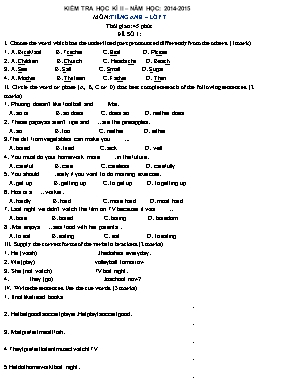Đề kiểm tra học kì II môn Tiếng Anh Lớp 7 - Năm học 2014-2015
Bạn đang xem tài liệu "Đề kiểm tra học kì II môn Tiếng Anh Lớp 7 - Năm học 2014-2015", để tải tài liệu gốc về máy bạn click vào nút DOWNLOAD ở trên

KIỂM TRA HỌC KÌ II – NĂM HỌC: 2014-2015 MÔN: TIẾNG ANH – LỚP 7 Thời gian: 45 phút ĐỀ SỐ 1: I. Choose the word which has the underlined part pronounced differently from the others. (1mark) 1. A. Breakfast B. Teacher C. East D. Please 2. A. Children B. Church C. Headache D. Beach 3. A. See B. Salt C. Small D. Sugar 4. A. Mother B. Thirteen C. Father D. Then II. Circle the word or phase (A, B, C or D) that best completes each of the following sentences. (2 marks) 1. Phuong doesn’t like football and Mai. A. so is B. so does C. does so D. neither does 2. These papayas aren’t ripe and .. are the pineapples. A. so B. too C. neither D. either 3.The dirt from vegetables can make you ... A. bored B. tired C. sick D. well 4. You must do your homework more . in the future. A. careful B. care C. careless D. carefully 5. You should . early if you want to do morning exercise. A. get up B. getting up C. to get up D. to getting up 6. Hoa is a .. worker. A. hardly B. hard C. more hard D. most hard 7. Last night we didn’t watch the film on TV because it was .. A. bore B. bored C. boring D. boredom 8 . Mai enjoys .. sea food with her parents . A. to eat B. eating C. eat D. to eating III. Supply the correct forms of the verbs in brackets. (2 marks) 1. He (wash).the dishes everyday. 2. We (play)volleyball tomorrow 3. She (not watch) TV last night. 4. they (go) .to school now? IV. Write the sentences. Use the cue words. (3 marks) 1. I/not like/read books . 2. He/be/good/soccer/player.He/play/soccer/good. . 3. Mai/prefer/meat/fish. . 4 They/prefer/listen/music/watch/TV . 5 He/do/homework/last night. . 6 Hoa/not go/school/yesterday/because/she/be/sick. . V. Read the passage carefully then answer questions. (2 marks) In 1960s, most people in Vietnam did not have a TV set. In the evening, the neighbors gathered around the TV. They watched until the TV programs finished. The children might play with their friends and the older people might talk together. Vietnam is different now. Many families have a TV set at home and the neighbors don’t spend much time together. Questions: 1. Did most people have a TV set in 1960s? 2.How long did they watch TV programs? 3. What might the children do? 4. What might the older people do?
Tài liệu đính kèm:
 de_kiem_tra_hoc_ki_ii_mon_tieng_anh_lop_7_nam_hoc_2014_2015.doc
de_kiem_tra_hoc_ki_ii_mon_tieng_anh_lop_7_nam_hoc_2014_2015.doc





